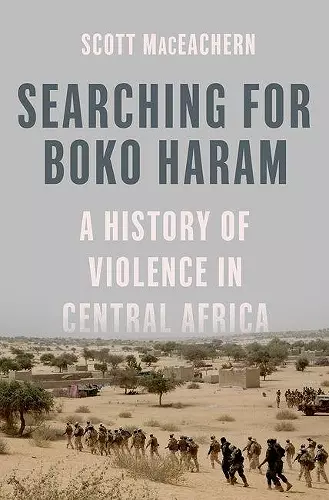Searching for Boko Haram
A History of Violence in Central Africa
Format:Hardback
Publisher:Oxford University Press Inc
Published:15th Mar '18
Currently unavailable, and unfortunately no date known when it will be back

This book places the insurgent group Boko Haram, which has terrorised northeastern Nigeria through the last six years, in an historical and cultural context. It examines cultural changes in the lands south of Lake Chad through deep time, showing how these ancient processes can help us think about Boko Haram's activities in the present. The archaeological and documentary record for this area is unusually rich for sub-Saharan Africa, and allows us to understand Boko Haram within an historical narrative that stretches back directly five centuries, with cultural origins that stretch even deeper into the past. One important way to understand Boko Haram is as a frontier phenomenon, the most recent manifestation of processes of horrific violence, identity production and wealth creation that have been part of political relationships in this area of Central Africa through the last millennium. In striking ways, Boko Haram resembles the slave-raiders and warlords who figure in precolonial and colonial writings about the southern Lake Chad Basin. In modern times, these accounts are paralleled by the activities of smugglers, bandits (coupeurs de route, 'road cutters') and tax evaders, illegal actors who stand in complex relationships to the governments of modern African nation-states. The borderlands of these states are often places where the state refuses to exercise its full authority, because of the profits and opportunities that illegal and semi-legal activities afford, among others to state officials and bureaucrats. For local people, Boko Haram's actions are thus to a great extent understood in terms of slave-raids and borderlands. Those actions are not some mysterious, unprecedented eruption of violence and savagery: they can be understood within local contexts of politics and history. This book is written to counter exoticised portrayals of Boko Haram's activities, and of the region as a whole.
Scott MacEachern's Searching for Boko Haram is an original, arresting and almost beautiful book, which excavates the very distant past to understand what seems. * Times Literary Supplement *
This book was not written solely for an audience of archaeologists nor of Africanists, it uses accessible language and takes care to explain terms and concepts that specialist audiences sometimes take for granted ... [MacEachern] has focused on imbuing the story of Boko Haram, and the communities impacted by them, with a historicity that marks the movement not just as an emergency of the moment spurred by current trends in global Islamic fundamentalist philosophy, but also one with deep-rooted connections to a place that has a history and cultural (frontier) logic all its own. In this, he succeeds admirably. * Natalie Swanepoel, African Archaeological Review *
By examining 'the lands of Boko Haram (p.3)... the author successfully debunks the assumption that the territories occupied by Boko Haram are remote and inaccessible... he makes a good case that there is much to be learned by investigating how human landscapes have developed in the region over time. * Survival *
he makes a good case that there is much to be learned by investigating how human landscapes have developed in the region over time. * Survival *
This is a masterful work, with the potential to have an impact beyond academia. It explores in a clear and compelling way an intricate cultural history to offer explanation for a specific case of globalized terrorism: a pressing contemporary issue... A book that explains the present through the past, but also the past through the present. It is time for archaeologists to follow his path and start to intervene in key contemporary debates with the unique perspective of the discipline. * Journal of African Archaeology *
The years spent in the field make this study invaluable for those interested in the Cameroonian dimension of Boko Haram. Indeed, MacEachern has been working as an archaeologist in Northern Cameroon since 1999 and his analysis of the complex and varied Northern Cameroonian societies is extremely well-written. Compared to other scholarship on Boko Haram, this short book is rather unique... In a context where most publications on the region focus solely on the last ten years of the Boko Haram conflict, MacEachern's far-reaching conclusions - despite their Cameroonian focus - bring an archaeological dimension to our understanding of the region. * Journal of African History *
Scott MacEachern's monograph makes a notable contribution to the study of the history of the Lake Chad Basin region in general and to the study of the activities of the militant Boko Haram group in particular. Indeed, the book may take a rightful place among the works of modern historians and social anthropologists. * Social Evolution & History *
ISBN: 9780190492526
Dimensions: 173mm x 239mm x 23mm
Weight: 558g
248 pages